
The Ultimate Guide to Master 3PL Logistics
Picture your business as a giant puzzle. Several pieces need to be placed to ensure you build the ultimate masterpiece. One of the pieces to create the ultimate solution is 3PL Logistics (third-party logistics). They become the key to supply chain and logistics, guiding the business to streamlined operations and unparalleled success. Third-party logistics is the heart of the business, connecting suppliers, manufacturers, distributors, and retailers efficiently and reliably.
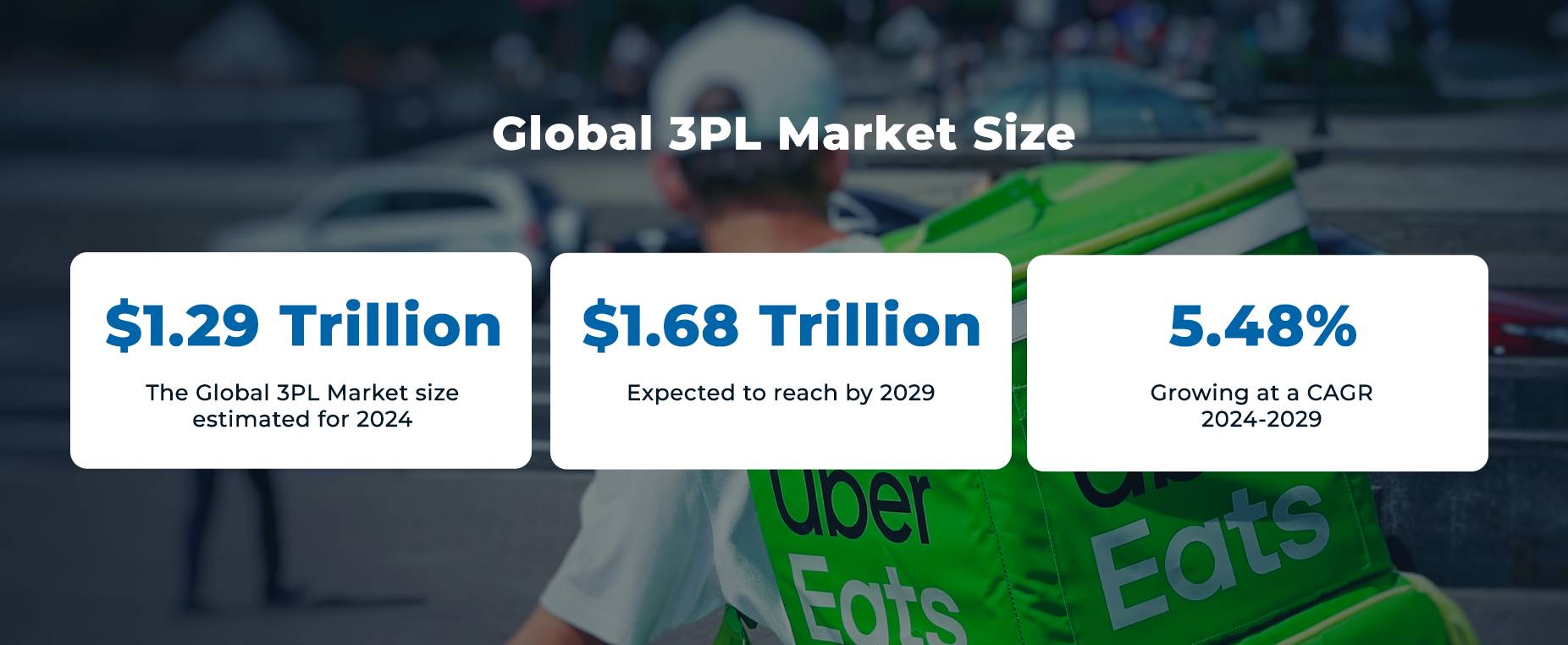
Imagine your favorite online store. You browse through a vast array of products, click ‘buy,’ and eagerly await the arrival of your purchase. Behind the scenes, 3PL logistics providers work tirelessly to ensure that your order reaches your doorstep swiftly and seamlessly. They’re like behind-the-scenes magicians, orchestrating a symphony of operations to fulfill your every desire.
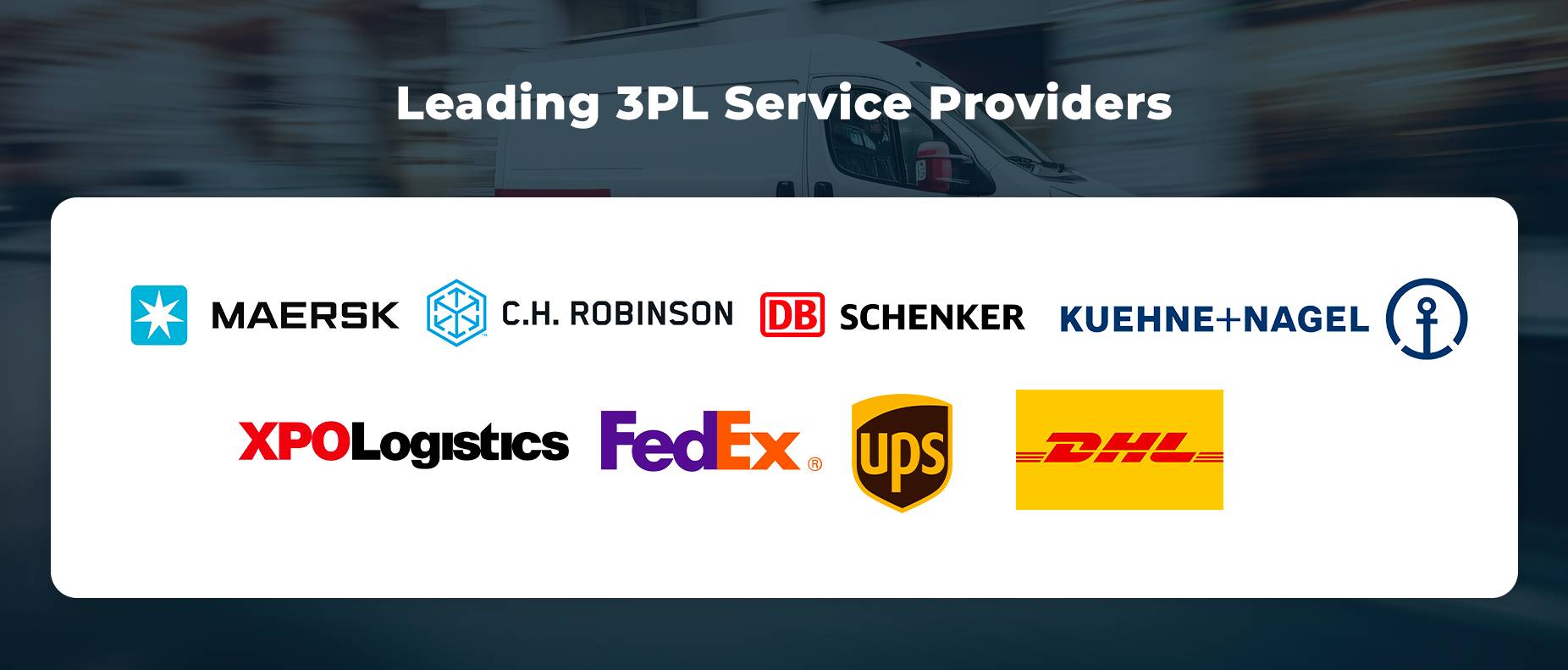
What is 3PL Logistics?
At its core, 3PL is short for third-party logistics. It represents a strategic outsourcing arrangement where companies delegate various logistics functions to specialized service providers. These third-party logistics providers handle a spectrum of tasks spanning warehousing, transportation, inventory management, order fulfillment, and distribution. In essence, they serve as the logistical backbone that keeps the supply chain engine humming smoothly.
Moreover, 3PL logistics isn’t a one-size-fits-all solution. It’s a customizable toolkit that can be tailored to suit the unique needs and challenges of each business. From startups to multinational corporations, companies of all sizes can benefit from the expertise and resources of 3PL providers.
Also Read: Why Does Your Delivery Management Tech Platform Need A Solid Integration Marketplace?
Why is 3PL Important in Today’s Supply Chain?
In today’s hyper-competitive business landscape, speed, agility, and customer satisfaction reign supreme. Here, the role of 3PL in the supply chain ecosystem cannot be overstated. Here’s why:
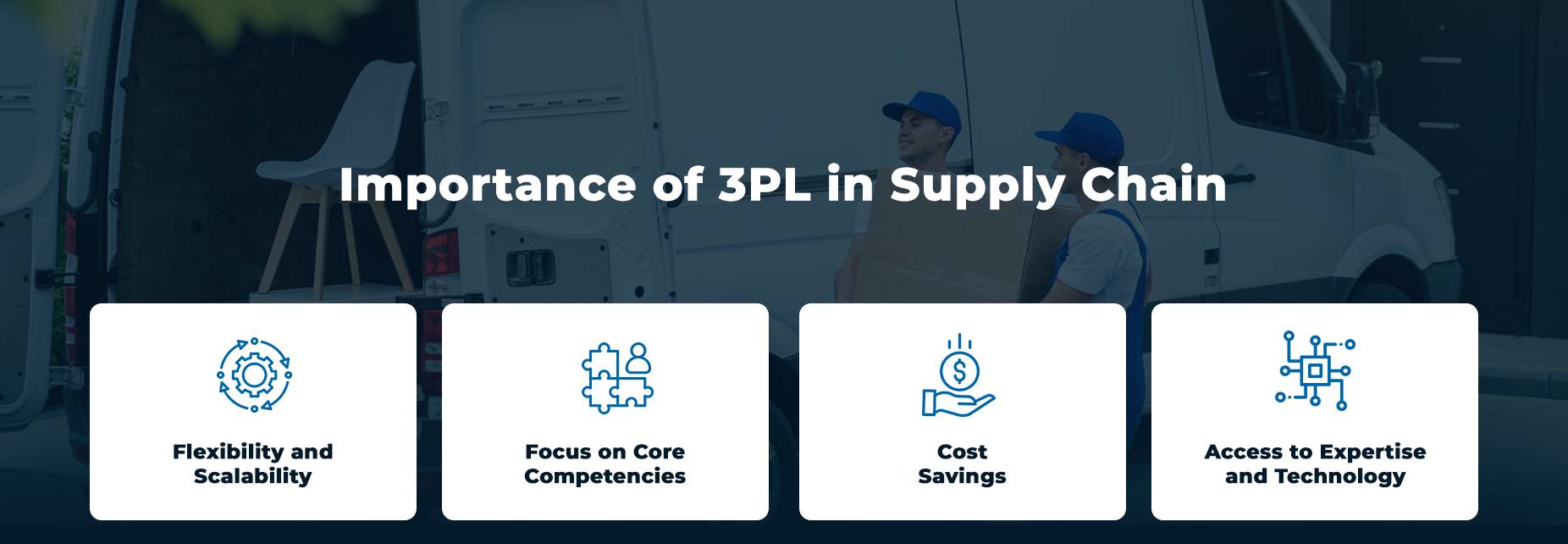
Flexibility and Scalability:
By leveraging the expertise and infrastructure of 3PL providers, companies gain the flexibility to scale their operations as market demands. Whether it’s handling seasonal peaks or expanding into new markets, 3PL offers the agility needed to stay ahead of the curve.
Focus on Core Competencies:
Outsourcing logistics functions to third-party specialists allows businesses to redirect their time, resources, and attention toward their core competencies. Instead of getting bogged down in the complexities of logistics, companies can concentrate on innovation, product development, and strategic growth initiatives.
Cost Savings:
By tapping into the economies of scale and operational efficiencies offered by 3PL providers, companies can often achieve significant cost savings compared to managing logistics in-house. From reducing warehousing expenses to optimizing transportation routes, 3PL enables businesses to maximize their bottom line while delivering value to customers.
Access to Expertise and Technology:
3PL providers bring a wealth of industry expertise, best practices, and cutting-edge technologies to the table. Partnering with 3PLs lets businesses use cutting-edge tools without big investments in infrastructure.
How does partnering with 3PL providers add value?
Imagine embarking on a challenging quest without a seasoned guide by your side. That’s akin to navigating the complex terrain of logistics without the assistance of 3PL providers. These experts bring a wealth of knowledge, experience, and industry insights to the table. Thus serving as invaluable allies in the journey toward operational excellence.
By partnering with 3PL providers, businesses gain access to a wealth of specialized expertise across various facets of logistics. These experts know how to tackle challenges and seize opportunities in warehouses and transportation routes.
Moreover, 3PL providers serve as strategic advisors. They offer tailored solutions that align with the unique needs and objectives of each client. Whether it’s devising innovative strategies to streamline operations or implementing cutting-edge technologies to enhance efficiency, these trusted partners are committed to driving tangible results and delivering measurable value.
Download: Integration Marketplace Infographic
Common Challenges in 3PL Logistics
Third-party logistics (3PL) offers numerous benefits to companies seeking to streamline their supply chain operations. It also presents several common challenges that must be addressed to ensure success and efficiency. Let’s explore some of these challenges:
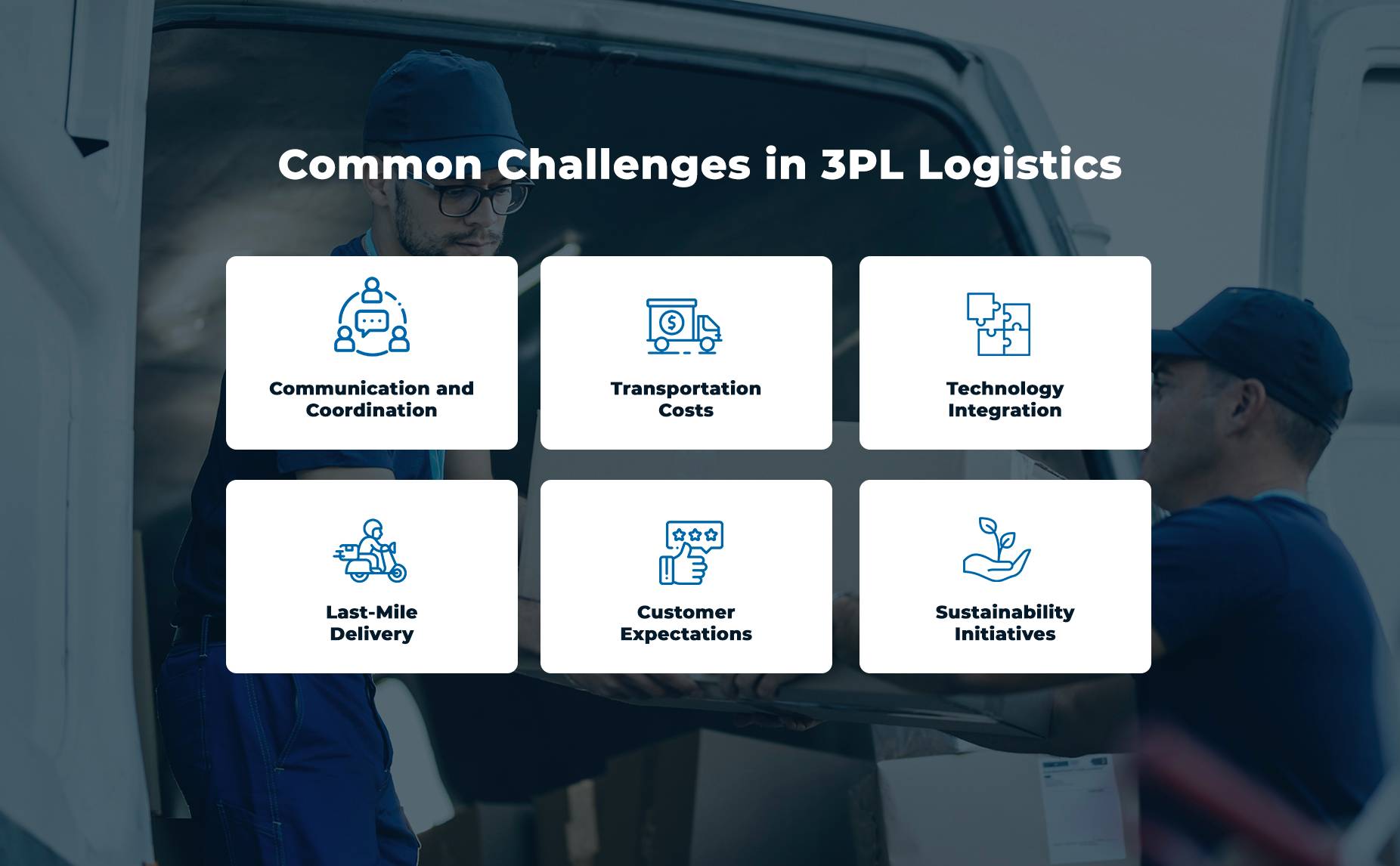
Communication and Coordination with 3PL:
Effective communication and coordination between the company and the 3PL provider are crucial for smooth logistics operations. Miscommunications or delays in information sharing can lead to errors, delays, and disruptions in the supply chain.
Transportation Costs using 3PL:
Rising transportation costs, fuel prices, and fluctuating freight rates can impact the profitability of 3PL operations. Balancing cost-effectiveness with service levels and transit times is a constant challenge for logistics providers.
Technology Integration with 3PL:
Integrating disparate systems, technologies, and platforms to ensure seamless data exchange and visibility can be complex and time-consuming. Compatibility issues, data silos, and legacy systems may hinder efforts to implement integrated solutions.
Last-Mile Delivery using 3PL:
Last-mile delivery poses unique challenges in urban areas, where traffic congestion, parking restrictions, and limited access to delivery points can impact efficiency and customer satisfaction. Finding cost-effective and sustainable solutions for last-mile logistics is a priority for 3PL providers.
Customer Expectations with 3PL:
Meeting and exceeding customer expectations for speed, accuracy, and service levels is a perpetual challenge in the competitive logistics industry. Delivering on promises, resolving issues promptly, and maintaining open communication are essential for building trust and loyalty with customers.
Sustainability Initiatives using 3PL:
Increasing pressure to adopt sustainable practices, reduce carbon emissions, and minimize environmental impact is reshaping the logistics industry. Implementing eco-friendly initiatives, optimizing transportation routes, and reducing waste are key priorities for 3PL providers to address sustainability challenges.
Advantages of 3PL Logistics
Third-party logistics (3PL) offers several advantages to companies looking to streamline their supply chain operations and improve overall efficiency. Some of the key advantages of 3PL logistics include:
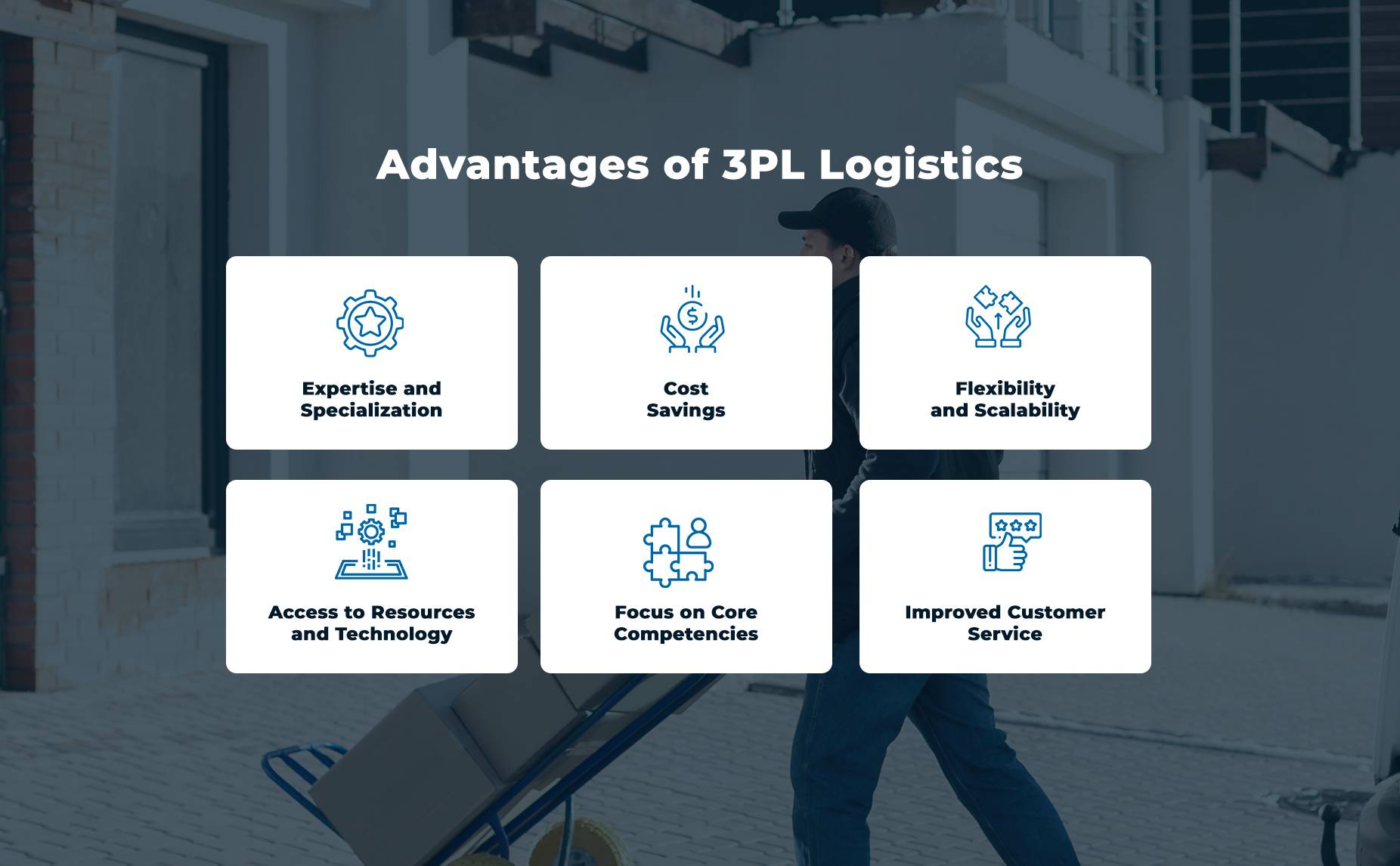
Expertise and Specialization:
3PL providers specialize in logistics management, bringing expertise and industry knowledge to the table. They stay abreast of the latest trends, technologies, and best practices, allowing them to optimize supply chain processes and drive continuous improvement.
Cost Savings:
Outsourcing logistics functions to a 3PL provider can result in cost savings for companies. 3PL providers can negotiate better rates with carriers, warehouses, and other service providers. They do this by leveraging economies of scale, bulk purchasing power, and efficient processes. This helps reduce overall logistics costs for their clients.
Flexibility and Scalability:
3PL providers offer flexibility and scalability to adapt to changing business needs and market conditions. Whether it’s seasonal fluctuations in demand, unexpected spikes in order volume, or expansion into new markets, 3PL providers can adjust resources and capabilities accordingly to meet their clients’ requirements.
Access to Resources and Technology:
Partnering with a 3PL provider gives companies access to a wide range of resources and advanced technologies that may be cost-prohibitive to implement in-house. From state-of-the-art warehouse management systems (WMS) and transportation management systems (TMS) to robotics, automation, and predictive analytics, 3PL providers invest in cutting-edge tools and technologies to drive efficiency and innovation in logistics operations.
Focus on Core Competencies:
Outsourcing logistics functions to a 3PL provider allows companies to focus on their core competencies and strategic priorities. By offloading non-core functions such as warehousing, transportation, and fulfillment to experts in the field, companies can redirect resources and attention to activities that directly contribute to their competitive advantage and bottom line.
Improved Customer Service:
3PL providers can help companies enhance customer service by ensuring timely and accurate order fulfillment, optimizing delivery routes, and providing real-time visibility into shipments. By delivering superior customer experiences, companies can strengthen customer loyalty, increase repeat business, and drive growth.
Innovations in 3PL Technologies
The landscape of third-party logistics (3PL) is rapidly evolving, driven by technological advancements that are reshaping traditional supply chain operations and revolutionizing the way companies manage their logistics processes. From robotics and automation to artificial intelligence (AI) and blockchain, let’s explore some of the most exciting innovations in 3PL technologies:
Robotics and Automation in 3PL Logistics:
Robotics and automation technologies are transforming warehouse operations and fulfillment processes, enabling 3PL providers to achieve higher levels of efficiency, accuracy, and productivity. Automated guided vehicles (AGVs), robotic pickers, and automated sorting systems streamline order fulfillment, reduce labor costs, and minimize errors in picking, packing, and shipping.
Artificial Intelligence (AI) and Machine Learning in 3PL Logistics:
AI and machine learning algorithms are revolutionizing supply chain planning, optimization, and decision-making processes. Predictive analytics, demand forecasting, and inventory optimization tools powered by AI enable 3PL providers to anticipate customer demand, optimize inventory levels, and optimize transportation routes, leading to improved efficiency and cost savings.
Internet of Things (IoT) in 3PL Logistics:
The Internet of Things (IoT) is transforming the way logistics operations are monitored, managed, and optimized. IoT-enabled sensors and devices provide real-time visibility into assets, shipments, and inventory, allowing 3PL providers to track and trace goods throughout the supply chain, monitor environmental conditions, and optimize resource allocation for greater efficiency and transparency.
Blockchain Technology in 3PL Logistics:
Blockchain technology is revolutionizing supply chain transparency, traceability, and trust, enabling secure and tamper-proof transactions and data exchanges across the logistics ecosystem. By leveraging blockchain-based platforms, 3PL providers can improve visibility, enhance security, and streamline documentation and compliance processes, reducing fraud, errors, and disputes.
Augmented Reality (AR) and Virtual Reality (VR) in 3PL Logistics:
AR and VR technologies are enhancing the training, maintenance, and operations of 3PL logistics facilities. AR-based smart glasses and headsets provide warehouse workers with hands-free access to real-time information, instructions, and guidance, improving accuracy and efficiency in picking, packing, and inventory management tasks.
Autonomous Vehicles in 3PL Logistics:
Autonomous vehicles, including drones, unmanned aerial vehicles (UAVs), and self-driving trucks, are revolutionizing last-mile delivery and transportation operations. By leveraging autonomous vehicle technology, 3PL providers can reduce delivery times, lower costs, and improve safety in urban and remote areas, providing faster and more reliable service to customers.
Conclusion
The future of logistics shines bright by embracing the power of third-party logistics (3PL). They remain the key to unlocking efficiency, innovation, and success in the ever-evolving marketplace. 3PL providers play a crucial role in optimizing supply chain operations, enhancing customer satisfaction, and driving business growth.
Embracing the power of 3PL logistics is not just about outsourcing logistics functions – it’s about forging strategic partnerships, driving continuous improvement, and staying ahead of the curve in a rapidly changing world. By embracing 3PL logistics, companies can unlock new opportunities, drive innovation, and achieve success in the dynamic and competitive landscape of modern business.
LogiNext is a leading provider of logistics management software solutions that help businesses optimize their supply chain operations and enhance efficiency. Our solution offers real-time visibility, predictive insights, and actionable intelligence across the entire logistics ecosystem. With easy integrations with 3PL logistics providers, our platform enables companies to leverage their existing infrastructure and maximize the value of their investments. To know more, click on the red button below.
120 1







Pingback: LogiNext-Blog | Supercharge Your Supply Chain by Mastering 3PL Partnership